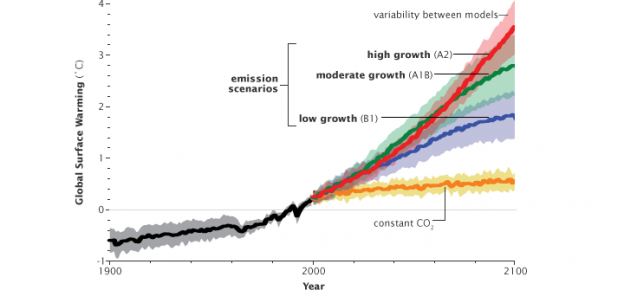Climate change is a fact1, the inefficiently captured work of combusted fossil fuels among the most notable culprits.
Personal transportation, seemingly a right, has petroleum consumption at a sustained high2, with each mile driven adding carbon to an atmosphere3 that we breathe and that protects all of humanity from the destructive rays of our Sun.
Continued burning of fossils mined from the Earth without balance is unthinkable; the lake is not infinitely big, releasing your tired oil directly into the creek had to stop.
Getting to a point of balance on consumption (emissions) and need is daunting, and that effort will extend beyond any of our lifetimes, 100, 200 years forward.
Coal-fired electricity generation has become an easy blame4, with the individual’s automobiles tertiary, in part due to scale: a very large power plant versus my single automobile – a discarded watch battery ending up in a landfill certainly can’t be the problem, can it?
American’s inabilities with conceiving scale and utilizing mathematics renders hindered understandings of the reality of the situation.5 Instead we let the effects of a heated atmosphere creep up on us exponentially when only to discover an irreversible cascade that will gut biologies, and economies. Yet Mother Nature will survive, she does not require the foolhardy to propagate.
And you and I need transportation, we need electricity, we need heat, and appreciate air conditioning, but can we strike that balance with less emotional fear?
Coal in North Dakota is a vital part of the electricity generation picture that should continue as we develop reliable and efficient technologies as alternatives.
Coal in North Dakota is working hard to improve on the processes of efficient combustion and transmission of electricity, and there is no better demonstration in the Nation than at the Great River Energy Coal Creek Station at Falkirk, ND.
Since inception, Great River Energy has led by example in design, in efficiency, in cleanliness, in transmission, in reclamation, with worker excellence, safety, and stewardship.6
As mankind works together to avoid the irreversible, hold captive not the producers of electricity who respond to need and opportunity, challenge instead the consumers who remain ignorant to individual significance to the problem and the resourcefulness to conserve.
Insist on investments in technologies that harness renewable energies, in solar and wind, power storage, even sequestration: could incentivizing the creation of massive oak plantations7 contribute to that balance? And do we need government to force our hand?
Only as alternatives come into fruition will the debate be tempered, rendering tertiary the necessity of the burning of fossil fuels.
References:
- http://earthobservatory.nasa.gov/Features/GlobalWarming/page5.php
- http://www.advisorperspectives.com/dshort/updates/DOT-Miles-Driven.php
- http://www.epa.gov/climatechange/ghgemissions/sources/transportation.html
- http://www.ucsusa.org/clean_energy/our-energy-choices/coal-and-other-fossil-fuels/how-coal-works.html#.VEk70YvF_p8
- http://changetheequation.org/press/new-survey-americans-say-%E2%80%9Cwe%E2%80%99re-not-good-math%E2%80%9D
- http://www.greatriverenergy.com/makingelectricity/coal/coalcreekstation.html
- http://www.ncbi.nlm.nih.gov/pmc/articles/PMC2359746/


